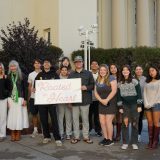
Latinx Revolutionary Horizons: Form and Futurity in the Americas Faculty Books
May 29, 2024
 In Latinx Revolutionary Horizons: Form and Futurity in the Americas, Dr. Renee Hudson (English) offers a powerful look into what it means to be Latinx. Many scholars have discussed the incoherence of this label given that Latinxs have a wide range of identities and experiences -in addition to different races and different religions. So the question becomes: Does it even make sense for Latinxs to think of themselves as a singular entity? Dr. Hudson’s book wrestles with this question and much more.
In Latinx Revolutionary Horizons: Form and Futurity in the Americas, Dr. Renee Hudson (English) offers a powerful look into what it means to be Latinx. Many scholars have discussed the incoherence of this label given that Latinxs have a wide range of identities and experiences -in addition to different races and different religions. So the question becomes: Does it even make sense for Latinxs to think of themselves as a singular entity? Dr. Hudson’s book wrestles with this question and much more.

Dr. Renee Hudson (English)
The Voice of Wilkinson sat down with Dr. Hudson for a Q&A on Latinx Revolutionary Horizons: Form and Futurity in the Americas.
Voice of Wilkinson: Tell us about the research that went into the book and what you learned along the way.
Dr. Renee Hudson: The book is super ambitious – it pairs contemporary Latinx literature with nineteenth-century novels. I focus on four revolutions: the Mexican Revolution, the People Power Revolution in the Philippines, resistance to Trujillo in the Dominican Republic, and the Cuban Revolution. I also look at how authors who don’t identify as Latinx turn to Latin/x American revolutionary imaginaries to theorize latinidad. This means that I had to be responsible for A LOT of history and also read materials in Spanish. I’ve always struggled with Spanish, but I learned that while it remains difficult for me, I can do it. I also found that I often wasn’t satisfied with the translations I came across, so that became part of the book – both in terms of critiquing translations and also offering some translations of my own.
VoW: What do you hope readers will gain from the book?
RH: I hope people see how deeply intertwined the histories of the Americas are. I often think, especially with the rise of Trump, that there’s this narrative that Latinxs are new to the United States, but we’ve been here all along. With the long history of U.S. interventions abroad, I hope on some level people will see that the border crisis is completely the United States’s own making. I don’t explicitly talk about the border in my book, but in offering a deep account of the historical relations between the UnitedStates and Mexico, the Philippines, the Dominican Republic, and Cuba, people will see how entangled the United States has been in each of these places.
VoW: Was there something that surprised you writing this book that you would like to share with us?
RH: I learned a lot more about Salomé Ureña, who was a revolutionary woman in the Dominican Republic in the nineteenth-century. She’s THE founding poet of the Dominican Republic and her patriotic poetry deeply engages with the political turmoil she experienced during her lifetime. She also worked closely with Eugenio María de Hostos to create the education system in the D.R. I wish I had had time to go to the Dominican Republic and look at their archives to learn more about her and her work since so little of it has been translated into English.
VoW: In the introduction, we asked … “Does it even make sense for Latinxs to think of themselves as a singular entity?” – What would be your answer to that question?
RH: In my book, I argue that latinidad, or a sense of Latinxness, isn’t here yet. I focus on the revolutionary potential of Latinx as a political formation and argue that it’s a form of political commitment that Latinxs need to work towards. In this way, I draw upon the term Chicanx, which names someone of Mexican American descent and someone who has particular political commitments. Striving for the not-yet-here of latinidad cues us to the ways that it’s a speculative, collective project that invites us to foreground the shared histories of colonization and the collective struggles that bring us together.
VoW: Are you working on anything else at the moment? Can you share that with us?
RH: Yes! I’m working on an article for a special issue of Genre: Forms of Discourse and Culture, on Latinx Horror. I’m looking at Silvia Moreno-Garcia’s Daughter of Dr. Moreau for that piece. I just finished teaching a seminar on Silvia Moreno-Garcia and thinking with my students helped me so much. I’m also writing the introduction for my own special issue of Chiricú Journal: Latina/o Literatures, Arts, and Cultures on Latinx YA and Children’s Literature. Finally, I have a research residency this summer to work on my second book project on Latinx girlhood.
We look forward to reading all your upcoming projects!

